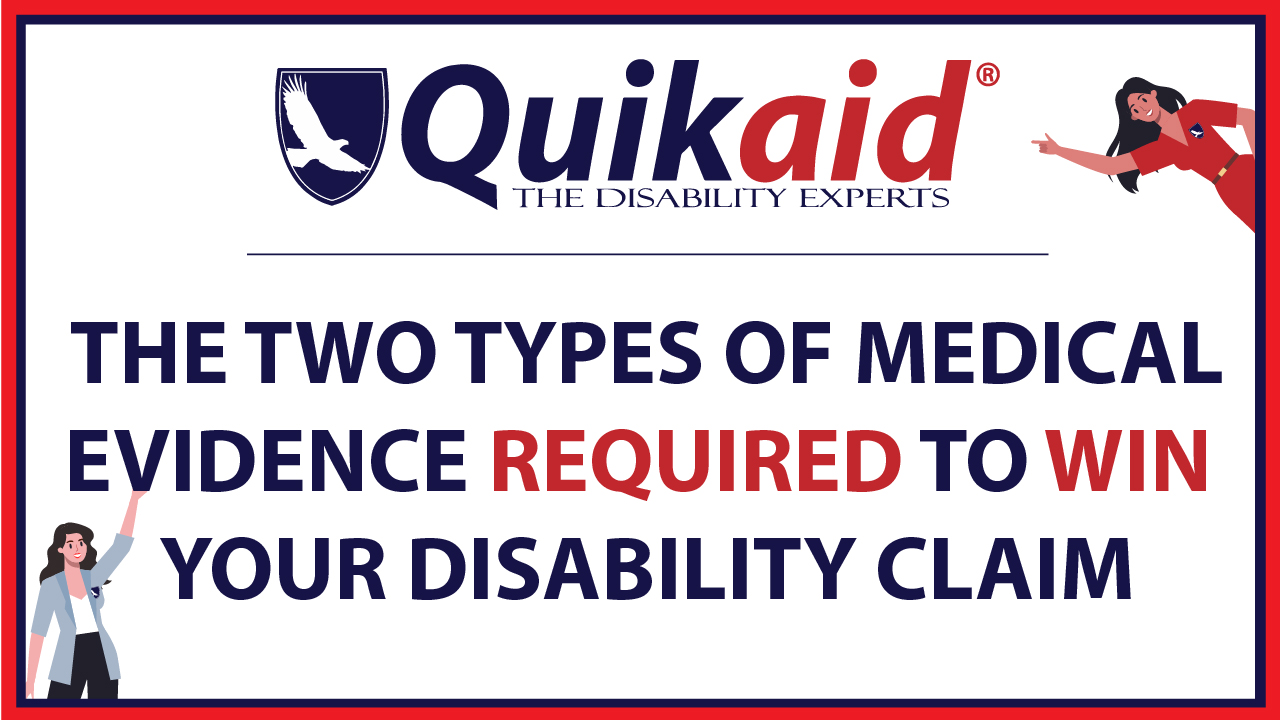The TWO Types of Medical Evidence Required to WIN Your Social Security Disability Claim

At Quickaid, we have obtained benefits for thousands of our clients since we started in 1993. What do all of these winning clients have in common?
It is actually pretty simple. They have strong and compelling medical evidence that demonstrate – beyond a reasonable doubt – that they are no longer able to work in a competitive manner due to their underlying disabilities. So, in a nutshell, medical evidence is basically all that matters. Medical evidence forms the foundation for a successful disability claim.
Based on Quikaid's decades of experience, we can boil it down to two categories of medical evidence that are overwhelmingly correlated with getting your claim approved.
Objective Medical Evidence
Objective medical evidence is the foundation upon which a successful disability claim is built.
Objective medical evidence is basically evidence that a Social Security judge can look at and evaluate. The opposite of objective medical evidence is subjective medical evidence. Subjective medical evidence is evidence that you speak, but subjective medical evidence is much weaker than objective medical evidence that can be properly evaluated.
How do I obtain objective medical evidence?
Examples of objective medical evidence include test results, such as MRI results, CT scan results, bloodwork results, and similar types of testing and objective clinical findings.
Objective medical evidence is generated when you visit a medical facility, such as a doctor’s office, a hospital, or a medical clinic. These objective medical findings provide clear, undeniable insights into your condition. Objective evidence carries far more weight than subjective complaints alone. When objective medical evidence corresponds to what you say – your subjective testimony – this makes for a strong disability case. But it starts with the objective medical evidence. Without it, cases are just generally not very strong and not likely to be approved.
Other Categories of Objective Medical Evidence
There are other categories of objective medical evidence that will be considered by the Social Security Administration.
For example, if you have had surgical procedures related to your disabling conditions, the surgical procedure and outcome are considered objective medical evidence – they clearly show what is wrong with you and how you have been treated and that you have attempted to improve your condition.
Of course, if the surgical procedure fixes your underlying issue, then you are not likely to be approved. But if the surgical procedure does not meaningfully improve the underlying issue, then it can result in a very favorable piece of objective medical evidence.
Objective Evidence for Mental Health Disorders
Medical treatment for mental health disorders also typically falls under objective medical evidence.
For example, if there have been periods of institutionalization and you’ve been under the care of a psychiatrist for your mental conditions, this will be reflected in objective medical evidence – the judge can see what is wrong because it will be reflected in your medical records. If you simply state you suffer from depression or anxiety, but these allegations are not reflected in your medical records, this is not a strong foundation upon which to build a successful claim.
Prescription and Medication Narrative
The second most important type of evidence is your prescription and medication history.
This includes a list of medications you currently take to mitigate or resolve the symptoms of your underlying condition. Your medication narrative serves as a concise summary of your overall medical condition. The types and intensity of medications you're prescribed can speak volumes about the severity of your condition.
For example, if you have kidney problems and your doctor prescribes lifestyle changes and medication to control your cholesterol, that does not reflect a level of seriousness of impairment that is typically required of an approved claim. However, if you have kidney issues and you are prescribed dialysis or high doses of strong medications, this provides a window into the gravity of your health challenges.
Prescription History
Your prescription history also matters if your claim is based on mental health issues.
If you suffer from mental health issues, having a prescribed medication or multiple medications will demonstrate to the judge several things. First, your conditions are severe enough that they require medications and, secondly, you are making efforts to address your underlying mental health issues.
It is also critical in these situations to comply with your doctor’s orders.
For example, if you are prescribed medications for your bipolar disorder, but don’t take the medications as prescribed, the judge will often view that as a lack of commitment on your part to get better. In fact, that goes for all medications prescribed by medical professionals, whether the prescription is for mental or physical impairments.
If you are prescribed medications but do not take them, that fact pattern will likely weaken your case – potentially significantly, depending on the judge. So, it is important to make sure the entire fact pattern regarding your prescription and medication narrative is compelling.
Conclusion
Strong objective medical evidence combined with a compelling medication fact pattern generally results in a strong claim.
While there may be other elements that come into play in evaluating your claim, focusing on these two areas can significantly enhance your chances of success. When we win cases, it is typically because our clients have taken their medical treatment and related prescriptions seriously – and they have the evidence to prove it.
The TWO Types of Medical Evidence Required to WIN Your Social Security Disability Claim
Share via:
HIRE AMERICA'S DISABILITY EXPERTS NOW
If you need disability benefits, hire Quikaid now. You will not regret it. We will do everything possible to get your claim approved.
Sign our contract now online, complete our Free Case Evaluation, or call (800) 941-1321 so we can start the process of getting you approved for benefits! You have nothing to lose, and everything to gain.
The time to get started is NOW!




